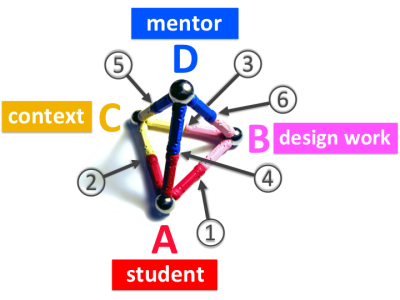
 John Wood 2014. Part of a draft paper intended to inform the development of more ethical learning/examination procedures in universities
John Wood 2014. Part of a draft paper intended to inform the development of more ethical learning/examination procedures in universities
Learning as a citizen
Assessment is different in the first and the second year of the course. This ensures that students have an extended opportunity to interrogate their personal values and ethical beliefs before they enter a more directed 'professional' phase in year two. First year students would be asked to identify a personal, and ambitious (intellectually and imaginatively) context for their assessment. This is intended to encourage big thinking that will inform their later, more professional, approach. It would give them a year in which to get more in touch with, their personal tastes and ethical values. This enhanced awareness would form the basis of how they choose a clearer professional role (at least) by the beginning of year two.
 |
|

For example:
- Students might be encouraged to identify themselves as private citizens, rather than as professional designers.
- Students would be encouraged to have regular meetings with an appropriate mentor. This mentor would probably be chosen in negotiation with the student's tutor, or programme leader. This should be someone who is willing and able to act as a 'sounding board' for ideas and progress options. Examples include:
- A peer (student from same cohort).
- A second year student
- A sympathetic visiting tutor
- A slightly more experienced designer
- First year students may be encouraged to define their context as everything that is not the project in question.
- This would encourage the student to look for a contextual background that is big enough, extravagant enough, or imaginative enough to accommodate their current interests, no matter how idiosyncratic, or strange, they may be.
| KEY | FOCUS | ASSESSABLE CRITERIA
|
A

| Personal self

| How well did I show that I self-reflexively understand, and can develop and manage, my personal interests, capabilities, career aspirations, ethical values, intellectual curiosity, style of thinking and working?
|
| B | Designs | How well did I show that I have developed my submitted coursework sufficiently that it will make sense within its own terms? For example, does it communicate its effectiveness to others on the basis of its clarity of purpose, usability, aesthetic appeal and/or (in the case of written work) argumentation and research?
|
| C | Context | How well did I show that my chosen context is sufficiently comprehensive and appropriate to makes sense within its own terms? For example, does it seem sensible/appropriate/obvious to all?
|
| D | Mentor | How well did I show that I have adequately learned from, and about, my mentor? For example, has he, or she, helped me to improve? Also, have I managed to impress, assist, or contribute something relevant to him, or her?
|

|

|

|
| KEY | RELATION | ASSESSABLE CRITERIA
|
| 1 | A with B | How well did I show that I have managed my personal capabilities, aspirations, values, interests, curiosity, style of thinking and working with what I have achieved in my coursework?
|
| 2 | A with C | How well did I show that my aspirations, values, interests, curiosity, style of thinking and working is relevant to the background context I have defined for it? For example, did it give me an adequate basis for considering ethical, environmental, political and entrepreneurial aspects of my work?
|
| 3 | B with C | How well did I show that my practical coursework, ideas and essays, etc. is relevant to the background context I have defined for it?
|
| 4 | A with D | How well did I show that I can relate to, empathise with, and work with, a mentor who is reasonably relevant to my capabilities, aspirations, values, interests, curiosity, style of thinking and working?
|
| 5 | C with D | How well did I show that I can understand my mentor's perception of a context for the work I am doing?
|
| 6 | B with D | How well did I show that I understand how useful my mentor would find the work I am doing? |
See Iceland Assessment Outline in Year TWO
Return to Iceland Assessment System
Return to home
John Wood 2014. Part of a draft paper intended to inform the development of more ethical learning/examination procedures in universities